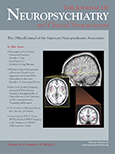Prevention of Post-Stroke Generalized Anxiety Disorder, Using Escitalopram or Problem-Solving Therapy
Abstract
This study examined the efficacy of antidepressant treatment for preventing the onset of generalized anxiety disorder (GAD) among patients with recent stroke. Of 799 patients assessed, 176 were randomized, and 149 patients without evidence of GAD at the initial visit were included in this double-blind treatment with escitalopram (N=47) or placebo (N=49) or non-blinded problem-solving therapy (PST; 12 total sessions; N=53). Participants given placebo over 12 months were 4.95 times more likely to develop GAD than patients given escitalopram and 4.00 times more likely to develop GAD than patients given PST. Although these results should be considered preliminary, the authors found that both escitalopram and PST were effective in preventing new onset of post-stroke GAD.



